| |
 |

For IBS Diarrhea, Constipation, Pain, & Bloating!
Stock Up! Save On All
Tummy Care Favorites!
|
 |
|
| |

February 19, 2013 ~ Scroll down for full newsletter or follow the links:
Ask Heather »
Good Bugs vs Bad Bugs? Antibiotics and Probiotics Part Two
IBS Recipe »
Hearty Mushroom Stroganoff with Noodles
News & Research »
Make Your Voice Heard for IBS Research - and Get Paid
Special Letter »
Diet Makes No Difference....Until It Changes Your Life!

|
|
Have questions? Call toll free (866) 640-4942.
Outside the US (206) 264 8069.
Enjoy the newsletter!
Heather Van Vorous & Heather's Tummy Care
Over 10 Years of IBS Business!
|
Did a friend send you this newsletter? Sign up here for your own free subscription.

Hearty Mushroom Stroganoff with Noodles This one-dish dinner is fast, easy and delicious. Meaty mushrooms replace the traditional beef that's an IBS trigger, soy/rice sour cream and yogurt substitute for high fat dairy, and cooked noodles provide a safe soluble fiber foundation.
This recipe is a good example of how cooking sulfurous veggies like onions and garlic makes them much more tolerable. The heat cooks off the sulfur, and also breaks down the insoluble fiber, making these potential (but highly nutritious) triggers much more IBS friendly. Remember, you have to be cautious with insoluble fiber fruits and veggies, but you do need to eat them for good health. If you treat them carefully you should be able to do so.
Makes 2-3 servings
1 1/4 lb. button, crimini, or mixed wild mushrooms, cleaned and thinly sliced
2 T olive oil
1 medium onion, thinly sliced
1 large garlic clove, minced
1-2 T sherry, to taste
2 T plain soy yogurt stirred together with 1 T Tummy Fiber
2 T soy or rice sour cream
salt and freshly ground pepper to taste
2 T chopped fresh parsley
1-2 t paprika, to taste
cooked wide noodles, such as linguine
In a large non-stick skillet over medium high heat, heat 1 T olive oil. Saute mushrooms in oil until very tender and most liquid has evaporated. Remove mushrooms to dish and set aside.
In same skillet, heat remaining 1 T oil over medium high and saute onions and garlic until golden and tender. Add cooked mushrooms and all remaining ingredients except noodles, turn heat to low, and heat through but be careful not to boil. If sauce is too thick, add a little soy or rice milk to thin. Serve mushroom mixture immediately over cooked noodles. Sprinkle with extra paprika for color.
Are you just learning how to eat for IBS? A little intimidated at the thought of special IBS recipes? Not quite sure just what makes these recipes special in the first place? Don't worry! Get Eating for IBS and find the answers to all your questions.
~ Heather's Tummy Fiber ~
For the Dietary Management of IBS Pain, Diarrhea, &, Constipation
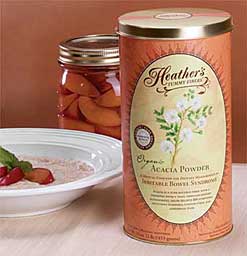
Certified Organic Acacia Senegal ~ Pure Soluble Fiber
The prebiotic fiber that relieves both diarrhea and constipation!
** Very Economical **
** 100% Acacia Senegal ** Never Low Grade Acacia Seyal
 Diet Makes No Difference....Until It Changes Your Life!
Diet Makes No Difference....Until It Changes Your Life!
Heather,
Your books have changed my life. I have had IBS for 6 years. I've been prescribed every thing from PPIs, to anti-depressants, to no avail. I have been told by gastroenterologists that diet makes no difference.
The diet strategies recommended in your book have stabilized my colon and given me my life back. Thank you so much.
Sincerely,
Kay C.
Westland, Michigan
Thank you so much, Kay. I had doctors tell me the same thing years ago. It's just appalling that some of them are still saying that! ~ Heather
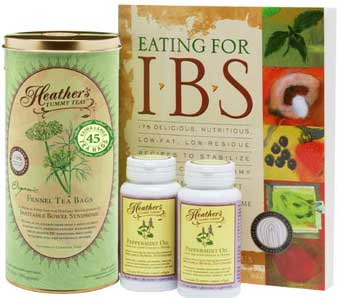
Get the IBS Diet Kit #1 - Comprehensive Help for IBS Pain, Bloating and Gas!
* Eating for IBS - the Groundbreaking Diet and Cookbook
* Organic Fennel Tummy Tea ~ Fast Relief of IBS Bloating and Gas!
* Peppermint Oil Tummy Tamers with Fennel Oil ~ prevent IBS pain and spasms!
 Make Your Voice Heard for IBS Research - and Get Paid!
Make Your Voice Heard for IBS Research - and Get Paid!
Focus Pointe Global is conducting a paid research study on Gastrointestinal Conditions. They're looking for people from the US ages 18-65 who are taking medication to treat IBS and/or CIC. Participation is via paid telephone interviews taking place in early March. Participants will earn $125 for 1 hour of their time.
There are no experimental treatments or sales involved and all answers will be kept confidential and used for research purposes only.
To see if you qualify, you can take a quick pre-screener or call 800-220-3730 and ask for reference #49846CD.
~ Heather's Tummy Tamers Peppermint Oil Capsules ~

Peppermint Oil Caps Called "Drug of Choice for IBS"
Our Peppermint Oil Caps have the added benefits of fennel and ginger oils, and they help prevent abdominal pain, gas, and bloating!

Recently, there has been a lot of confusion surrounding antibiotics and IBS. Many people with IBS have had bad experiences with antibiotics of all kinds. The drugs often cause GI side effects and can make IBS symptoms much worse. But lately, there has been a flurry of news and research suggesting that a specific antibiotic might actually help IBS. What's all this about? ~ Heather
In part one of our special series on antibiotics and IBS, we covered the bad guys.
Traditionally, broad-spectrum antibiotics (prescribed for all kinds of infections, to children and adults alike) often cause mild to severe gastrointestinal side effects, even for people who don't have IBS. This is because those drugs not only kill the bacteria causing the infection you're treating, but they also kill the friendly bacteria, called "flora", that live in your intestines.
These friendly bacteria normally regulate the consistency of stools and help with digestion. There is a growing mountain of research that this gut flora is actually of critical importance not just for bowel health, but overall disease resistance as well.
However, an antibiotic called Rifaximin (brand name Xifaxan) was recently reviewed by the FDA as a treatment for IBS - specifically, for bloating, abdominal pain, and diarrhea. What's going on?
Rifaximin is a broad-spectrum non-systemic antibiotic, which means that little of the drug will pass through the gastrointestinal wall into circulation. It has been approved by the FDA and prescribed for years for preventing and treating traveler's diarrhea caused by E. coli, and has few side effects with this use.
Over the past several years, Rifaximin has also been studied in several clinical trials as a treatment for non-constipation IBS, with some interesting results. One of the lead researchers, Dr. Mark Pimentel of Cedars-Sinai Medical Center in California, has been a strong proponent of Rifaximin and has gone so far as to say he believes that the "missing link," or root cause of most IBS symptoms, can actually be attributed to an overgrowth of bacteria in the small intestine.
In fact, initial studies of Rifaximin and IBS were based on the researchers' hypothesis that a large proportion of IBS patients had small intestinal bacterial overgrowth (SIBO). Initial studies actually reported SIBO in up to 80% of IBS patients.
However - as a rule, IBS should only be diagnosed when other disorders that can cause similar symptoms - including SIBO - have been ruled out. Unfortunately, diagnosing SIBO can be difficult. The most common diagnostic procedure, a hydrogen breath test, can have a high rate of false positives.
When subsequent IBS studies used the standard method of jejunal aspiration and bacterial culturing to diagnose SIBO, the small intestinal bacterial overgrowth was found in only 4% of IBS patients.
Clearly, this is a murky area of IBS. Small intestinal bacterial overgrowth (or SIBO) is normally considered to be a different disorder than IBS, even though the symptoms (abdominal pain, bloating, bowel dysfunction) are strikingly similar. Gastroenterologists vary wildly in their estimates of the number of people diagnosed with IBS who actually have undiagnosed SIBO. Making matters even murkier is the fact that it's possible for someone to have both SIBO and IBS. Some physicians have already begun to treat patients diagnosed with IBS for SIBO.
Recent trials of Rifaximin showed that the antibiotic achieved statistically better results than a placebo for treating non-constipation IBS - but not that much better.
In the Rifaximin group, 41% of patients reported adequate relief of IBS symptoms, versus 32% in the placebo group. In the Rifaximin group, 41% of patients reported adequate relief of bloating, versus 30% in the placebo group. Results were similar for at least 2 of the first 4 weeks of the trials, and in an analysis of relief of symptoms during the 10-week period after the end of the treatment.
An editorial by Jan Tack, M.D., Ph.D. that accompanied the study in the NEJM summarized the good news / bad news aspects of the trials:
Good - The sustained symptom improvements lasting at least 10 weeks, after a short treatment course, are encouraging.
Good - Bloating was one of the symptoms successfully addressed, and bloating tends to be one of the most challenging aspects of IBS.
Bad - The rates of response to treatment are only 9% to 12% better with Rifaximin than placebo, which is in the lower spectrum of what's considered to be clinically relevant.
Bad - Though not all patients have a response with Rifaximin, data suggest that a subgroup of patients may have a substantial response. However, it's unclear how to identify this group.
Bad - IBS is a chronic disorder, and although Rifaximin's effects persisted after the 2-week treatment period, the response over time suggests that there is some loss of effectiveness with symptoms toward the end of the 10-week follow-up. It's not known whether patients would have a favorable response again with retreatment.
The FDA apparently shares some of these reservations about Rifaximin for IBS, as they've ruled that before the antibiotic can be approved for treating IBS, its manufacturer (Salix Pharmaceuticals) must provide data on how the drug should be used in retreating patients with recurrent symptoms.
So - should you try taking an antibiotic for IBS? This is a question worth asking your gastroenterologist, if you do not have constipation and you haven't responded to other treatments. Ask if there are generic antibiotics that might be comparable to Rifaximin (this may be a much more affordable option, and more likely to be covered by insurance). Ask if you've had the tests to rule out SIBO, and if so, what the results were.
Interestingly, probiotics are also being studied and, in some cases, recommended for both SIBO and IBS. This is also an area worth asking your doctor about, particularly since probiotics don't carry the risks and side effects of antibiotic drugs.
Finally, consider using a prebiotic soluble fiber to help encourage the growth of healthy gut bacteria naturally. This can help keep both IBS and SIBO symptoms under control.
~ Heather
Did you miss our recent "Ask Heather" and Part One of antibiotics versus probiotics for IBS?
  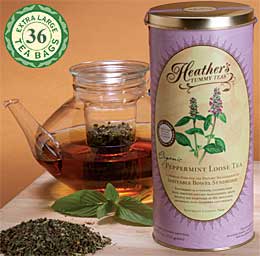
Organic High Volatile Oil Fennel & Peppermint Tummy Tea Bags
Extraordinary Quality ~ Very Economical
Fennel is terrific for bloating & gas, Peppermint is great for IBS pain & spasms.
Heather's Fennel Tummy Tea Heather's Peppermint Tummy Tea
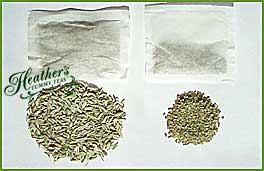  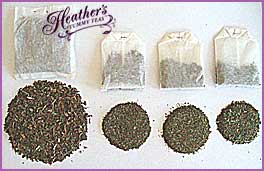
Compare for yourself! The pictures above show the huge difference in the quantity and quality of tea per teabag. The price comparison here is even more shocking!

Shop at Heather's Tummy Store for IBS
HelpForIBS.com
The only store that's just for IBS - so we only carry the very best

You're on this newsletter list because you have expressed interest in IBS news and information.
Unsubscribe Here
Change your newsletter email address here.
If you are viewing this newsletter on a website and would like to subscribe for email delivery, please "Join the IBS Newsletter" here.
ANTI-SPAM PRIVACY & SECURITY POLICY
HelpForIBS.com
Heather's Tummy Care
80 S. Washington St, #304
Seattle, WA 98104 USA
© 2013 Heather Van Vorous, Heather's Tummy Care. All rights reserved.
Authored by Heather Van Vorous. May not be reproduced without permission.
USA Copyright Office Registration Number TXU 1-270-858 and others.
|
|
| |